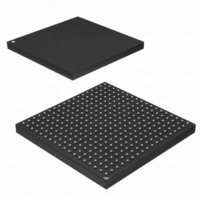AT91SAM9M10-CU Atmel, AT91SAM9M10-CU Datasheet - Page 729

AT91SAM9M10-CU
Manufacturer Part Number
AT91SAM9M10-CU
Description
IC MCU 16/32BIT ARM9 324TFBGA
Manufacturer
Atmel
Series
AT91SAMr
Specifications of AT91SAM9M10-CU
Core Processor
ARM9
Core Size
16/32-Bit
Speed
400MHz
Connectivity
EBI/EMI, Ethernet, I²C, SPI, SSC, UART/USART, USB
Peripherals
AC'97, DMA, LCD, POR, PWM, WDT
Number Of I /o
160
Program Memory Size
64KB (64K x 8)
Program Memory Type
ROM
Ram Size
128K x 8
Voltage - Supply (vcc/vdd)
0.9 V ~ 1.1 V
Data Converters
A/D 8x10b
Oscillator Type
Internal
Operating Temperature
-40°C ~ 85°C
Package / Case
324-TFBGA
Processor Series
AT91SAMx
Core
ARM926EJ-S
Data Bus Width
32 bit
Data Ram Size
32 KB
Interface Type
2-Wire, SPI, USART
Maximum Clock Frequency
133 MHz
Number Of Programmable I/os
5
Number Of Timers
2 x 16 bit
Operating Supply Voltage
1.65 V to 3.6 V
Maximum Operating Temperature
+ 85 C
Mounting Style
SMD/SMT
3rd Party Development Tools
JTRACE-ARM-2M, MDK-ARM, RL-ARM, ULINK2
Development Tools By Supplier
AT91SAM-ICE, AT91-ISP, AT91SAM9M10-G45-EK
Controller Family/series
AT91
No. Of I/o's
160
Ram Memory Size
64KB
Cpu Speed
400MHz
No. Of Timers
2
Rohs Compliant
Yes
Cpu Family
AT91
Device Core
ARM926EJ-S
Device Core Size
32b
Frequency (max)
400MHz
Total Internal Ram Size
64KB
# I/os (max)
160
Number Of Timers - General Purpose
7
Operating Supply Voltage (typ)
1.8/2.5/3.3V
Operating Supply Voltage (max)
1.1/1.95/3.6V
Operating Supply Voltage (min)
0.9/1.65/1.8/3V
On-chip Adc
8-chx10-bit
Instruction Set Architecture
RISC
Operating Temp Range
-40C to 85C
Operating Temperature Classification
Industrial
Mounting
Surface Mount
Pin Count
324
Package Type
TFBGA
Lead Free Status / RoHS Status
Lead free / RoHS Compliant
Eeprom Size
-
Lead Free Status / Rohs Status
Lead free / RoHS Compliant
Available stocks
Company
Part Number
Manufacturer
Quantity
Price
Company:
Part Number:
AT91SAM9M10-CU
Manufacturer:
Atmel
Quantity:
996
- Current page: 729 of 1404
- Download datasheet (22Mb)
35.9.1
35.9.2
35.10 CE-ATA Operation
35.10.1
6355B–ATARM–21-Jun-10
SDIO Data Transfer Type
SDIO Interrupts
Executing an ATA Polling Command
The SD/SDIO Card Register (HSMCI_SDCR) allows selection of the Card Slot and the data bus
width.
The SD/SDIO Card bus allows dynamic configuration of the number of data lines. After power
up, by default, the SD/SDIO Card uses only DAT0 for data transfer. After initialization, the host
can change the bus width (number of active data lines).
SDIO cards may transfer data in either a multi-byte (1 to 512 bytes) or an optional block format
(1 to 511 blocks), while the SD memory cards are fixed in the block transfer mode. The TRTYP
field in the HSMCI Command Register (HSMCI_CMDR) allows to choose between SDIO Byte or
SDIO Block transfer.
The number of bytes/blocks to transfer is set through the BCNT field in the HSMCI Block Regis-
ter (HSMCI_BLKR). In SDIO Block mode, the field BLKLEN must be set to the data block size
while this field is not used in SDIO Byte mode.
An SDIO Card can have multiple I/O or combined I/O and memory (called Combo Card). Within
a multi-function SDIO or a Combo card, there are multiple devices (I/O and memory) that share
access to the SD bus. In order to allow the sharing of access to the host among multiple devices,
SDIO and combo cards can implement the optional concept of suspend/resume (Refer to the
SDIO Specification for more details). To send a suspend or a resume command, the host must
set the SDIO Special Command field (IOSPCMD) in the HSMCI Command Register.
Each function within an SDIO or Combo card may implement interrupts (Refer to the SDIO
Specification for more details). In order to allow the SDIO card to interrupt the host, an interrupt
function is added to a pin on the DAT[1] line to signal the card’s interrupt to the host. An SDIO
interrupt on each slot can be enabled through the HSMCI Interrupt Enable Register. The SDIO
interrupt is sampled regardless of the currently selected slot.
CE-ATA maps the streamlined ATA command set onto the MMC interface. The ATA task file is
mapped onto MMC register space.
CE-ATA utilizes five MMC commands:
CE-ATA utilizes the same MMC command sequences for initialization as traditional MMC
devices.
• GO_IDLE_STATE (CMD0): used for hard reset.
• STOP_TRANSMISSION (CMD12): causes the ATA command currently executing to be
• FAST_IO (CMD39): Used for single register access to the ATA taskfile registers, 8 bit access
• RW_MULTIPLE_REGISTERS (CMD60): used to issue an ATA command or to access the
• RW_MULTIPLE_BLOCK (CMD61): used to transfer data for an ATA command.
1. Issue READ_DMA_EXT with RW_MULTIPLE_REGISTER (CMD60) for 8kB of DATA.
2. Read the ATA status register until DRQ is set.
aborted.
only.
control/status registers.
AT91SAM9M10
729
Related parts for AT91SAM9M10-CU
Image
Part Number
Description
Manufacturer
Datasheet
Request
R

Part Number:
Description:
MCU, MPU & DSP Development Tools KICKSTART KIT FOR AT91SAM9 PLUS
Manufacturer:
IAR Systems

Part Number:
Description:
DEV KIT FOR AVR/AVR32
Manufacturer:
Atmel
Datasheet:

Part Number:
Description:
INTERVAL AND WIPE/WASH WIPER CONTROL IC WITH DELAY
Manufacturer:
ATMEL Corporation
Datasheet:

Part Number:
Description:
Low-Voltage Voice-Switched IC for Hands-Free Operation
Manufacturer:
ATMEL Corporation
Datasheet:

Part Number:
Description:
MONOLITHIC INTEGRATED FEATUREPHONE CIRCUIT
Manufacturer:
ATMEL Corporation
Datasheet:

Part Number:
Description:
AM-FM Receiver IC U4255BM-M
Manufacturer:
ATMEL Corporation
Datasheet:

Part Number:
Description:
Monolithic Integrated Feature Phone Circuit
Manufacturer:
ATMEL Corporation
Datasheet:

Part Number:
Description:
Multistandard Video-IF and Quasi Parallel Sound Processing
Manufacturer:
ATMEL Corporation
Datasheet:

Part Number:
Description:
High-performance EE PLD
Manufacturer:
ATMEL Corporation
Datasheet:

Part Number:
Description:
8-bit Flash Microcontroller
Manufacturer:
ATMEL Corporation
Datasheet:

Part Number:
Description:
2-Wire Serial EEPROM
Manufacturer:
ATMEL Corporation
Datasheet:











